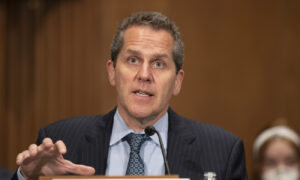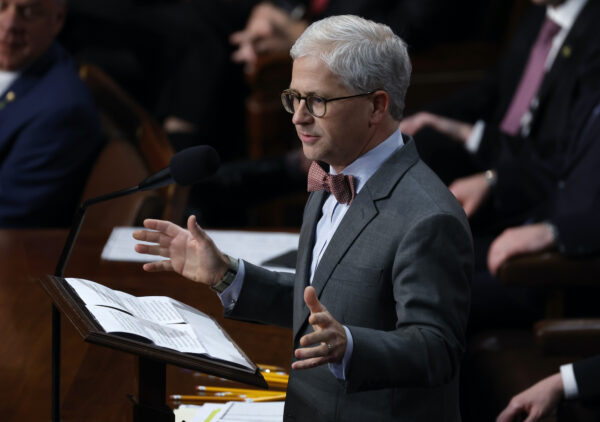Cultural Shift in Federal Reserve Supervision Another Contributor to Banking Turmoil: House Panel
Since the COVID-19 public health crisis, the Federal Reserve system has undergone a cultural shift in supervision, and this may have been another contributing factor to the turmoil in the banking system, a House committee heard. The House Financial Services Committee hosted a hearing on May 16. It featured testimony from Fed vice chair for supervision Michael S. Barr and Federal Deposit Insurance Corp. chair Martin Gruenberg. Lawmakers combed through the central bank’s recent Supervision and Regulation Report that reviewed the failures of Silicon Valley Bank and Signature Bank and the reasons for their collapse. One of the findings within the review, which Barr spearheaded, was that there had been a cultural shift in Fed supervision, something that emanates from the coronavirus pandemic. Rep. Patrick McHenry (R-N.C.), the committee chair, pounced on this component and noted that the report revealed a cultural shift in supervision inside both the Federal Reserve Bank of San Francisco and across the Federal Reserve system. McHenry asked if supervisors felt impeded from reporting problems at the banks to their superiors. Barr explained that “supervisors were more reluctant than they had been to escalate issues,” citing a series of interviews with staff. The other development on the supervisory front had been the paucity of in-person visits to the banks. U.S. Rep.-elect Patrick McHenry (R-N.C.) at the U.S. Capitol Building in Washington, D.C., on Jan. 6, 2023. (Chip Somodevilla/Getty Images) “One of the findings of the report is that the pandemic contributed to a reduction in supervisory intensity,” Barr said. But while one of the conclusions was that federal regulators fell asleep at the wheel, Rep. Pete Sessions (R-Tx.) pushed back against the suggestion that it was all the supervisors’ fault. Because many of the Federal Reserve and the Treasury Department leaders purported that inflation was transitory, the economy was strong, and the financial system was sound, Sessions thinks it is hard to blame the supervisors for not engaging in greater scrutiny. “The highest level of financial integrity comes from the Fed and the Treasury Secretary [Janet Yellen],” Sessions told Barr. “You’ve got to, at some point, somebody’s got to accept the responsibility that they were misled at the top of your organization.” “We were told repeatedly that’s not going to happen, transitory not going to happen. Everything is okay. You guys were overstating it. And now you can blame them,” he added. More Oversight of Bank Pay Needed With three bank failures so far this year, Barr called for more oversight of how executives of financial institutions are compensated. “Our oversight of incentive compensation for bank managers should also be improved,” Barr said in his opening remarks. “SVB’s senior management responded to the poor incentives approved by its board of directors. They were not compensated to manage the bank’s risk, and they did not do so effectively.” At a much-anticipated May 16 Senate Banking Committee hearing, bank CEO compensation came into focus, with senators questioning whether these executives were rewarded for short-term gains instead of organizations’ long-term health. “You were paying out bonuses until literally hours before regulators seized your assets. To people in Ohio and around the country, this feels sickeningly familiar,” said Sen. Sherrod Brown (D-Ohio), who is also the committee chair. “To most Americans, a lack of Wall Street accountability tracks with their entire experience with our economy. Workers face consequences; executives ride off into the sunset.” Greg Becker, the former SVB CEO, earned $9.9 million in 2022, and sold company stock just two weeks before the bank failed. Following the collapse of SVB and Signature, President Joe Biden encouraged Congress to impose stricter penalties on senior bank executives. This included banning executives from working in the banking industry again. “When banks fail due to mismanagement and excessive risk-taking, it should be easier for regulators to claw back compensation from executives, to impose civil penalties, and to ban executives from working in the banking industry again,” the president said. Bipartisan legislation introduced by two Democrats and two Republicans proposed extending the FDIC’s authority in order to claw back compensation to executives in the five years leading up to a bank’s failure. But Thomas Quaadman, an executive vice president at the Center for Capital Market Competitiveness, has not been not quick to endorse this measure. During a Senate Banking Committee hearing earlier this month, for example, he warned against implementing new compensation policies, citing an executive pay initiative in Switzerland in 2013 that prohibited bonuses and restricted salary. “From 2013 moving forward, Credit Suisse cited those compensation policies as an obstacle to their being able to retain and attract talent and actually fl

Since the COVID-19 public health crisis, the Federal Reserve system has undergone a cultural shift in supervision, and this may have been another contributing factor to the turmoil in the banking system, a House committee heard.
The House Financial Services Committee hosted a hearing on May 16. It featured testimony from Fed vice chair for supervision Michael S. Barr and Federal Deposit Insurance Corp. chair Martin Gruenberg.
Lawmakers combed through the central bank’s recent Supervision and Regulation Report that reviewed the failures of Silicon Valley Bank and Signature Bank and the reasons for their collapse. One of the findings within the review, which Barr spearheaded, was that there had been a cultural shift in Fed supervision, something that emanates from the coronavirus pandemic.
Rep. Patrick McHenry (R-N.C.), the committee chair, pounced on this component and noted that the report revealed a cultural shift in supervision inside both the Federal Reserve Bank of San Francisco and across the Federal Reserve system.
McHenry asked if supervisors felt impeded from reporting problems at the banks to their superiors. Barr explained that “supervisors were more reluctant than they had been to escalate issues,” citing a series of interviews with staff.
The other development on the supervisory front had been the paucity of in-person visits to the banks.

“One of the findings of the report is that the pandemic contributed to a reduction in supervisory intensity,” Barr said.
But while one of the conclusions was that federal regulators fell asleep at the wheel, Rep. Pete Sessions (R-Tx.) pushed back against the suggestion that it was all the supervisors’ fault.
Because many of the Federal Reserve and the Treasury Department leaders purported that inflation was transitory, the economy was strong, and the financial system was sound, Sessions thinks it is hard to blame the supervisors for not engaging in greater scrutiny.
“The highest level of financial integrity comes from the Fed and the Treasury Secretary [Janet Yellen],” Sessions told Barr. “You’ve got to, at some point, somebody’s got to accept the responsibility that they were misled at the top of your organization.”
“We were told repeatedly that’s not going to happen, transitory not going to happen. Everything is okay. You guys were overstating it. And now you can blame them,” he added.
More Oversight of Bank Pay Needed
With three bank failures so far this year, Barr called for more oversight of how executives of financial institutions are compensated.
“Our oversight of incentive compensation for bank managers should also be improved,” Barr said in his opening remarks. “SVB’s senior management responded to the poor incentives approved by its board of directors. They were not compensated to manage the bank’s risk, and they did not do so effectively.”
At a much-anticipated May 16 Senate Banking Committee hearing, bank CEO compensation came into focus, with senators questioning whether these executives were rewarded for short-term gains instead of organizations’ long-term health.
“You were paying out bonuses until literally hours before regulators seized your assets. To people in Ohio and around the country, this feels sickeningly familiar,” said Sen. Sherrod Brown (D-Ohio), who is also the committee chair. “To most Americans, a lack of Wall Street accountability tracks with their entire experience with our economy. Workers face consequences; executives ride off into the sunset.”
Greg Becker, the former SVB CEO, earned $9.9 million in 2022, and sold company stock just two weeks before the bank failed.
Following the collapse of SVB and Signature, President Joe Biden encouraged Congress to impose stricter penalties on senior bank executives. This included banning executives from working in the banking industry again.
“When banks fail due to mismanagement and excessive risk-taking, it should be easier for regulators to claw back compensation from executives, to impose civil penalties, and to ban executives from working in the banking industry again,” the president said.
Bipartisan legislation introduced by two Democrats and two Republicans proposed extending the FDIC’s authority in order to claw back compensation to executives in the five years leading up to a bank’s failure.
But Thomas Quaadman, an executive vice president at the Center for Capital Market Competitiveness, has not been not quick to endorse this measure.
During a Senate Banking Committee hearing earlier this month, for example, he warned against implementing new compensation policies, citing an executive pay initiative in Switzerland in 2013 that prohibited bonuses and restricted salary.
“From 2013 moving forward, Credit Suisse cited those compensation policies as an obstacle to their being able to retain and attract talent and actually flagging that as a risk to the long-term health of the bank,” Quaadman said. “We need to keep that in mind because we also know how that ended.”
Credit Suisse, which was founded in the 1850s, failed last month and was taken over by it Swiss competitor UBS.












